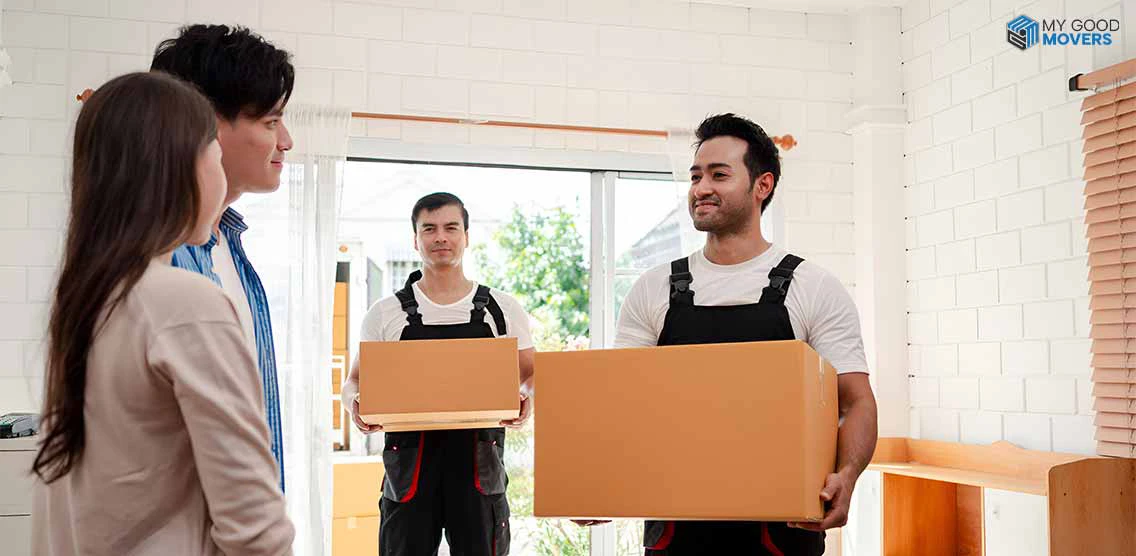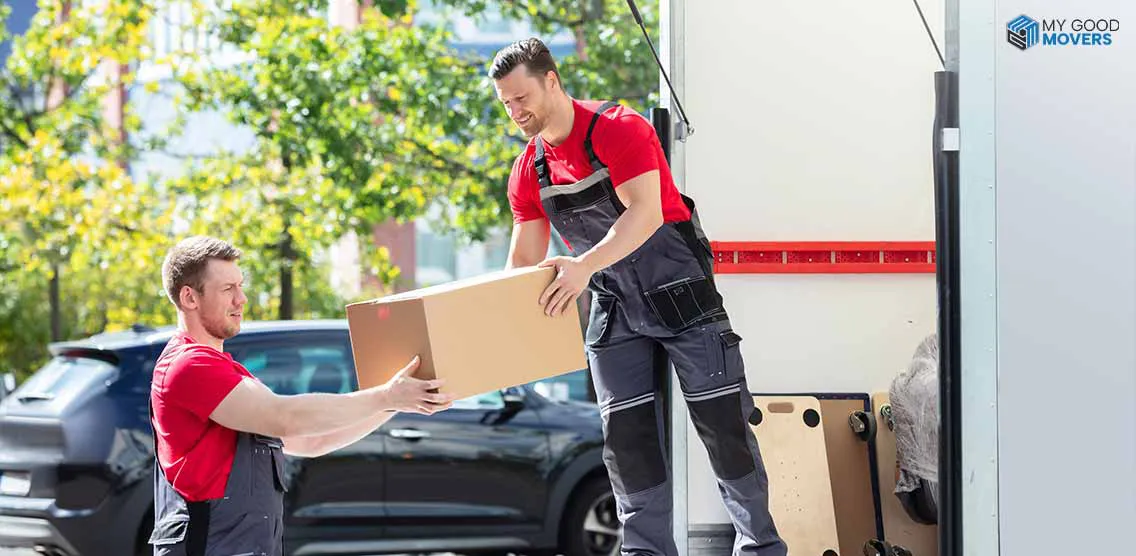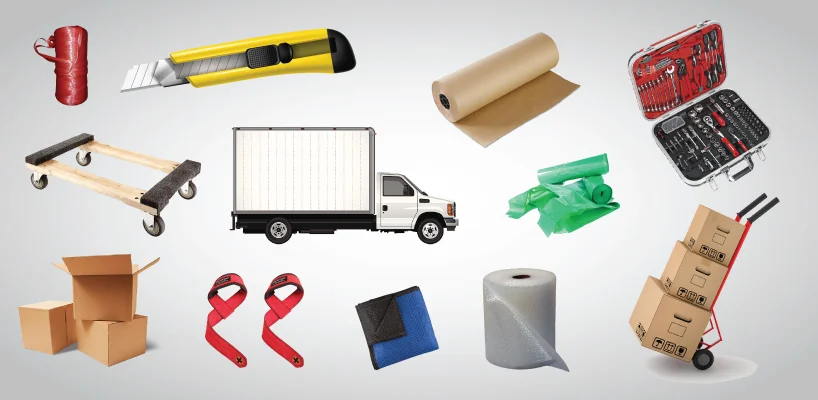They say, “If you want something done right, do it yourself,” but after lifting boxes, hauling furniture, and questioning your life choices halfway through, you might rethink that advice.
The real question when moving isn’t just when or where; it’s how. Do you roll up your sleeves for a DIY move or bring in full-service movers to make life easier?
It’s not a small decision. It can impact your time, budget, stress levels, and whether your friends ever answer your calls again.
Right now, you might be sitting there wondering:
Is DIY moving cheaper?
Is it worth the hassle?
Do full-service movers handle everything? And how do you know which option makes sense for your situation?
Both options come with their perks, their headaches, and those sneaky hidden costs.
The fact is that 73% of Americans believe moving companies overcharge; however, nearly half of those who DIY their move admit that it ends up being more expensive than expected.
So… yeah, there’s more to this decision than just saving money.
Let’s discuss and help you decide whether to roll up your sleeves or supervise your move.
What is DIY Moving?
DIY moving is exactly what it sounds like — you handle the entire move yourself. That means packing, renting the truck, loading your stuff, driving, unloading, and probably bribing your friends with pizza to help.
People often opt for the DIY route to save money and maintain control. You decide how things get packed when you move and how everything gets done.
However, DIY moving isn't just about saving a few bucks. It costs time and energy and usually leaves you sore and exhausted by the end of the day.
What are Full-Service Movers?
Full-service movers are the “sit back and let someone else deal with it” option.
They handle the heavy lifting — literally. Packing, loading, transporting, unloading, and even unpacking if you want the full VIP treatment. Some companies will also provide packing supplies, furniture disassembly, and set up in your new place.
It’s convenient, it’s stress-saving, and yes — it’s more expensive upfront. However, for many people, trading physical exhaustion for peace of mind is worth every dollar.

Not sure where to start with your move? Get step-by-step guidance with our Week-by-Week Moving Checklist.
Pros & Cons: DIY vs. Full-Service Movers
Now you know the basics. But each option comes with perks and a few headaches. Let’s break it down:
DIY Moving Pros
- Feels cheaper upfront
- Full control over your schedule and packing
- Great if you have minimal stuff or short distances
- You set the pace — no waiting on anyone else.
DIY Moving Cons
- Physical exhaustion — your back will feel it
- Renting trucks, buying supplies and fuel can add up fast
- Risk of damaging furniture or hurting yourself
- You’ll owe your friends big favors
Full-Service Movers Pros
- Professionals handle packing, loading, and transport.
- Saves time, stress, and sore muscles
- Great for long-distance moves or complicated jobs
- They know how to protect fragile or bulky items.
Full-Service Movers Cons
- Costs more upfront
- Less control over timing or how things are packed
- Need to research to avoid sketchy companies.

Looking for a trusted professional to handle your next move? Check out our best moving companies in the USA and move stress-free.
Cost Comparison of DIY and Full-Service Moving
So, let’s get to the part everyone wants to know — how much does this cost?
At first glance, DIY moving appears to be the budget-friendly option. But when you start adding up truck rentals, gas, packing supplies, and those unexpected costs that always pop up, it’s not always the bargain you think it is.
On the other hand, full-service movers may seem expensive upfront, but the convenience, time saved, and reduced risk of damage often make it worth every penny.
Let’s compare both options side by side.
Typical Expenses for DIY Moving
Truck Rental: $300 – $800 (plus gas, mileage, and tolls)
Packing Supplies: $150 – $300 (boxes, tape, padding)
Moving Equipment Rental: $50 – $100 (dollies, blankets, straps)
Fuel Costs: $100 – $300, depending on distance
Extra Costs: Potential costs for parking permits, insurance, and last-minute supplies
Typical Expenses for Full-Service Moving
Local Move: $1,200 – $3,500 (depends on home size and distance)
Long-Distance Move: $3,000 – $7,000+
Packing Services (optional): $300 – $600
Insurance Coverage: Often included or offered as an upgrade
Tipping Movers: Typically, $20 – $50 per mover
Hidden Costs in Both Options
For DIY Moves:
- Fuel surcharges, extra rental hours, and damaged truck fees
- Lost time from work
- Potential injury or damage to belongings
For Full-Service Moves:
- Additional fees for stairs, long carries, or narrow streets
- Extra charges for last-minute schedule changes
- Packing supplies, if not included
Which One is Cheaper?
If your move is small and local, and you've got the energy (plus a few willing friends), DIY moving can save you money if you plan carefully.
But if you’re moving long-distance, have a lot of heavy furniture, or simply can’t afford the time and hassle, full-service movers often make more sense. Sometimes, when you factor in hidden costs and your own time, DIY isn’t always the cheaper route after all.

Want to save cash without the moving day chaos? Check out our guide on how to find cheap movers and reduce your cost.
When to Go for DIY Moving?
DIY moving isn’t for everyone, but sometimes, it just makes sense.
If you’re working with a smaller space, staying relatively local, and you don’t mind getting your hands dirty (or your muscles sore), a DIY move could save you money and give you full control over the process.
Here’s when rolling up your sleeves might be the smart move:
Short-Distance Moves: If you’re relocating within the same city or just a few towns over, the logistics are simpler, and the costs stay low.
Minimal Belongings: If you don’t have a house full of furniture, heavy appliances, or delicate items, a DIY move is much more manageable.
Flexible Schedule: DIY moving gives you full control over the timeline, allowing you to spread the move over several days without strict deadlines.
Tight Budget: If every dollar counts, DIY often feels more affordable, especially for smaller moves.
Strong Support Network: Friends, family, neighbors - if you have a solid crew willing to pitch in, DIY becomes less stressful.
When is Full-Service Moving the Better Choice?
Sometimes, doing it yourself just isn’t the smartest option, and that’s okay. Full-service movers exist for a reason, and in certain situations, they’re worth the cost.
Here’s when hiring professional movers makes the most sense:
Long-Distance Moves: If you’re crossing state lines or relocating across the country, the logistics get complicated fast. Full-service movers handle the details, so you don’t have to stress about driving a loaded truck for hours (or days).
Large Homes or More Belongings: Having more belongings means more time, more heavy lifting, and a higher chance of breaking something. Movers bring the manpower and expertise to get the job done efficiently.
Tight Timelines: Need to be in your new place ASAP? Professional movers can expedite the process and handle packing, loading, and unloading promptly.
Heavy or Specialty Items: Pianos, antiques, oversized furniture — this isn’t the time for trial and error. Pros know how to move fragile, valuable, or awkward items safely.
Limited Physical Ability: If you’re injured, have mobility challenges, or simply can’t do the heavy lifting, full-service movers take care of everything for you.
Prioritizing Peace of Mind: Sometimes, peace of mind is worth the price. If the thought of packing and hauling stresses you out, let the pros handle it.

Not sure how to pick the right moving company? Our Ultimate Checklist for Selecting a Mover breaks down the process for you.
Tips for a Successful DIY Move
So, you've decided to go the DIY route. That's great, but honestly, making it up as you go never works on a moving day. A little preparation goes a long way when you're in charge.
Book Rental Trucks Early: Especially during busy seasons (summer, holidays, weekends). Waiting until the last minute means limited options and higher prices.
Pack Efficiently: Use sturdy boxes and bubble wrap for breakables, and label all items clearly. In the future, you will thank yourself when unpacking.
Use Moving Equipment: Dollies, furniture, blankets, and straps. These save your back and your belongings. Most rental companies offer them for a small fee.
Keep Safety Front: Lift with your legs, not your back. Don’t overload boxes. And clear paths through hallways and doorways to avoid accidents.
How to Choose Full-Service Movers?
If you’re leaning toward hiring full-service movers, choosing the right company is everything. A good mover can make your relocation smooth.
The wrong one? Total headache. Here’s how to pick movers you can trust:
Do Your Research: Start with online reviews, but don’t stop there. Ask friends, family, or neighbors for recommendations. Local word-of-mouth can save you from picking a company that looks good online but disappoints in real life.
Compare Multiple Quotes: Get at least three written estimates. Be cautious of lowball offers — if it sounds too good to be true, it probably is.
Verify Their Credentials: Ensure the moving company is licensed and insured. For long-distance moves, check with the U.S. Department of Transportation for regulations and guidelines.
Ask What’s Included: Some companies charge extra for stairs, long carries, or packing materials. Always get clear details upfront to avoid surprise fees.
Read The Contract Carefully: Before signing anything, understand cancellation policies, insurance coverage, and how they handle lost or damaged items.

Want peace of mind on a moving day? Protect yourself with our guide on how to know if a moving company is legitimate.
Is It Better to Hire Movers or Do It Yourself?
So, after weighing the pros, cons, and costs, what’s the final verdict? Is it better to tackle the move yourself or bring in the pros?
The answer depends on your situation.
If you’re moving locally, have minimal belongings, and have the time (and friends) to help, DIY can save money, but it requires effort.
On the other hand, if your move involves heavy lifting and long distances, or you just want less stress, full-service movers are worth the cost.
The right choice is the one that saves your time, money, and sanity.
Recommended Recoures















































 (239) 799–6077
(239) 799–6077